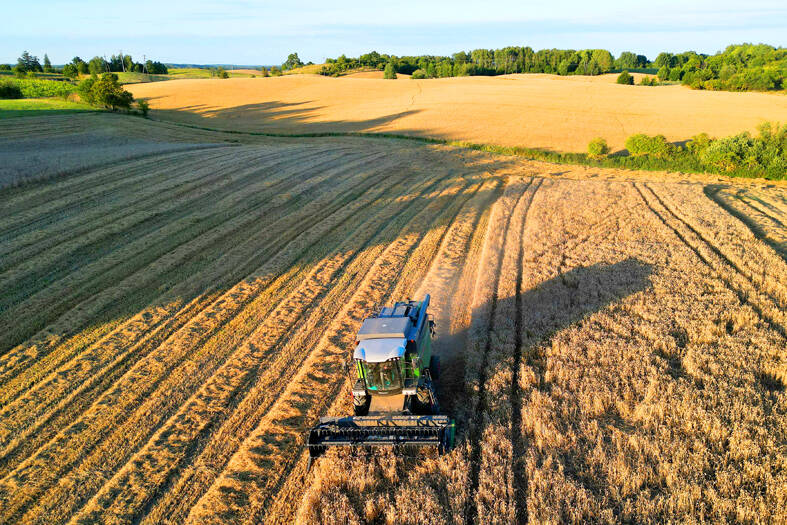The world is likely to face major disruption to food supplies well before temperatures rise by the 1.5°C target, the president of the UN’s desertification conference said, as the effects of a climate crisis combined with water scarcity and poor farming practices threaten global agriculture.
Alain-Richard Donwahi, a former Ivory Coast defense minister who led last year’s UN COP15 summit on desertification, said that the effects of drought were taking hold more rapidly than expected.
“Climate change is a pandemic that we need to fight quickly. See how fast the degradation of the climate is going — I think it’s going even faster than we predicted,” he said. “Everyone is fixated on 1.5°C [above preindustrial levels], and it’s a very important target. But actually, some very bad things could happen, in terms of soil degradation, water scarcity and desertification, way before 1.5°C.”

Photo: Reuters
The problems of rising temperatures, heat waves and more intense droughts and floods, were endangering food security in many regions, Donwahi said.
Look at “the effects of droughts on food security, the effects of droughts on migration of population, the effect of droughts on inflation. We could have an acceleration of negative effects, other than temperature,” he said.
Poor farming practices are not helping, he added.
“The degradation of soil comes with bad habits, and the way we do our agriculture will lead to degradation of the soil. When the soil is affected, the yield is affected,” he said.
Donwahi said the world could not afford to ignore desertification.
“We need to solve all the problems together. Desertification and drought leads to climate change, leads to loss of biodiversity. And when you have climate change you have droughts, floods, storms,” he said.
“It’s not only the poor countries, everybody is in the same boat [on food security]. Climate change, droughts, storms, floods don’t know any boundaries, they don’t need a visa to go into a country,” he added.

‘CORRECT IDENTIFICATION’: Beginning in May, Taiwanese married to Japanese can register their home country as Taiwan in their spouse’s family record, ‘Nikkei Asia’ said The government yesterday thanked Japan for revising rules that would allow Taiwanese nationals married to Japanese citizens to list their home country as “Taiwan” in the official family record database. At present, Taiwanese have to select “China.” Minister of Foreign Affairs Lin Chia-lung (林佳龍) said the new rule, set to be implemented in May, would now “correctly” identify Taiwanese in Japan and help protect their rights, the Ministry of Foreign Affairs said in a statement. The statement was released after Nikkei Asia reported the new policy earlier yesterday. The name and nationality of a non-Japanese person marrying a Japanese national is added to the

AT RISK: The council reiterated that people should seriously consider the necessity of visiting China, after Beijing passed 22 guidelines to punish ‘die-hard’ separatists The Mainland Affairs Council (MAC) has since Jan. 1 last year received 65 petitions regarding Taiwanese who were interrogated or detained in China, MAC Minister Chiu Chui-cheng (邱垂正) said yesterday. Fifty-two either went missing or had their personal freedoms restricted, with some put in criminal detention, while 13 were interrogated and temporarily detained, he said in a radio interview. On June 21 last year, China announced 22 guidelines to punish “die-hard Taiwanese independence separatists,” allowing Chinese courts to try people in absentia. The guidelines are uncivilized and inhumane, allowing Beijing to seize assets and issue the death penalty, with no regard for potential

‘UNITED FRONT’ FRONTS: Barring contact with Huaqiao and Jinan universities is needed to stop China targeting Taiwanese students, the education minister said Taiwan has blacklisted two Chinese universities from conducting academic exchange programs in the nation after reports that the institutes are arms of Beijing’s United Front Work Department, Minister of Education Cheng Ying-yao (鄭英耀) said in an exclusive interview with the Chinese-language Liberty Times (the Taipei Times’ sister paper) published yesterday. China’s Huaqiao University in Xiamen and Quanzhou, as well as Jinan University in Guangzhou, which have 600 and 1,500 Taiwanese on their rolls respectively, are under direct control of the Chinese government’s political warfare branch, Cheng said, citing reports by national security officials. A comprehensive ban on Taiwanese institutions collaborating or

STILL COMMITTED: The US opposes any forced change to the ‘status quo’ in the Strait, but also does not seek conflict, US Secretary of State Marco Rubio said US President Donald Trump’s administration released US$5.3 billion in previously frozen foreign aid, including US$870 million in security exemptions for programs in Taiwan, a list of exemptions reviewed by Reuters showed. Trump ordered a 90-day pause on foreign aid shortly after taking office on Jan. 20, halting funding for everything from programs that fight starvation and deadly diseases to providing shelters for millions of displaced people across the globe. US Secretary of State Marco Rubio, who has said that all foreign assistance must align with Trump’s “America First” priorities, issued waivers late last month on military aid to Israel and Egypt, the